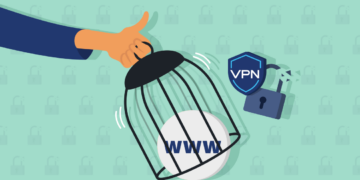
Venezuela has faced growing censorship over the course of the past few years. With elections just around the corner, President Maduro is clamping down on free speech and targeting political dissidents more than ever before.
Add to this the use of disinformation campaigns (including AI-generated content) and mass surveillance, and the reality of censorship in Venezuela quickly becomes apparent.
To stay in power, Venezuela’s government censors all type of content and sites, including:
- Political opposition
- Social media platforms
- Independent news
A VPN can help Venezuelan citizens, and tourists, circumvent these bans. Surfshark offers high-end encryption and hides the fact that you’re using a VPN by making it look like regular traffic.
Surfshark
Below, we catch you up on the state of censorship in Venezuela and give you a breakdown of ways to get around it.
Censorship in Venezuela is getting worse: on the World Press Freedom Index for 2023, Venezuela ranked 159th out of 180 countries.
With pro-government disinformation spreading rapidly online and independent media becoming increasingly stifled, the Maduro government continues to suppress people’s access to information in light of the 2024 general elections. Journalists risk physical attacks, arrests, and persecution for daring to speak up. More importantly, infrastructure failures continue to disrupt people’s online access.
Citizens who want access to independent outlets have to use a VPN to bypass government censorship. The best VPN for Venezuela, as tested by our own cybersecurity team, is Surfshark, which has the most advanced privacy and security features at the affordable price of $ 2.19 per month.
With a VPN, you can browse the web anonymously and keep access to an open internet. Below, we delve into the state of censorship in Venezuela and how to protect yourself against government tracking.
A Descent into Authoritarianism: Restricted Press Freedom

Venezuela’s once vibrant and diverse media landscape has been deteriorating since the presidency of Hugo Chávez and continues to do so under President Nicolás Maduro.
While freedom of the press is protected by the Constitution, reality paints a stark picture of authoritarianism and censorship of traditional media outlets and online media.
The country suffers from years of economic recession, resulting in limited access to public services. Moreover, the Maduro government does not shy away from surveillance, spreading pro-government propaganda, and silencing dissenting opinions.
Let’s take a closer look.
Freedom of expression under attack
Venezuela’s ongoing humanitarian and economic crisis has put pressure on its (online) media landscape. Since Maduro came into power, three of the largest media organizations were sold to pro-government owners. Media pluralism has seen a stark decline.
In 2021, authorities seized the headquarters of the El Nacional news outlet. The newspaper lost a defamation suit—El Nacional is one of the few papers that has dared to be critical of Maduro’s government—and the building was overtaken.
Over the course of Maduro’s presidency, a total of 55 newspapers have stopped circulating as a result of Venezuelan government censorship.
Media censorship online
Online censorship is persistent. Over the course of 2022, the Maduro government ordered Venezuela internet service providers to block 70+ websites, most of which belonged to independent news outlets.
Website blocks also extend beyond news. Online political and socioeconomic content, as well as sites belonging to non-governmental organizations, are also subject to targeting.
Notably, Venezuela’s legal framework makes intermediary platforms excessively responsible for user-generated content. This leads to preemptive censorship since host sites want to avoid liability. Moreover, unblocking websites that have been restricted can also prove challenging.
Obstacles to internet access
Venezuela’s telecommunications infrastructure suffers from frequent blackouts and extremely poor connection speeds, which are among the slowest in the world.
Over the course of the first nine months of 2022, Venezuela experienced 138,200 power failures, as reported by the Committee of People Affected by Blackouts.
Moreover, Venezuelans often struggle to afford internet access, the costs of which exceed the monthly minimum wage. This creates a terrible disparity between high-income and low-income areas and restricts people’s access to information.
The state owns the majority of the national network.
Attacks on journalists and dissidents
The Venezuela government cracks down on anyone who dares speak out against it. Journalists who report critically on Venezuelan politics may face physical attacks, harassment, and even imprisonment.
Journalists risk being beaten or threatened for doing their work, especially during politically tense times such as the 2024 election period.
As a result of this, self-censorship is not uncommon, and the fear of detention and reprisal is widespread. Those looking to protect themselves online can benefit from a VPN’s online protection. Surfshark is our top VPN for Venezuela because of its enhanced encryption and robust unblocking capabilities.
Disinformation campaigns
The Maduro government uses coordinated disinformation campaigns to expand its control and influence over the population. There is also encouragement for loyal, pro-government social media users to harass dissidents.
With the rise of AI-generated content, these pro-government campaigns have become more sophisticated. A YouTube channel named House of News Español (now suspended) would pose as a legitimate news outlet while using AI-generated avatars to spread misinformation.
Maduro himself has referred to AI-generated content as “revolutionary intelligence” rather than criticizing it. Users who dare to speak out risk reprisals for expressing their opinions.
Why Does Venezuela Censor the Internet?
The current state of the Venezuela internet and journalistic censorship in the country is politically motivated. Censorship helps keep the government and President Maduro in power despite political opposition, protests, and uprisings.
Censorship, in this sense, is a tool for political and social control. It is exercised both online and offline and strengthened by surveillance and disinformation.
By blocking access to content that covers anti-government ideas and criticism of President Maduro, the Venezuelan authorities attempt to shape the domestic narrative.
In doing so, they deny people access to the realities of corruption and socioeconomic issues.
Self-censorship
The Press and Society Institute of Venezuela has reported that nearly 54% of communication professionals in Venezuela deliberately omit information out of fear of reprisal.
On top of that, Freedom House has identified that 40% of media won’t report on political and economic issues. Self-censorship in Venezuela is rampant.
One particular piece of legislation, known as the Law Against Hatred, includes penalties of up to 20 years in prison, media shutdowns, and high fines.
What Content is Being Censored?

Venezuela mainly targets its censorship efforts on online journalism and political opposition. However, censorship takes various forms.
Independent news sites
Venezuela internet service providers are frequently forced to block online news and information platforms. Coverage of anti-government protests, political criticism, government corruption, and more have been taken down or made inaccessible.
The online version of the aforementioned El Nacional newspaper has been intermittently blocked. The same has occurred with independent media outlets like La Patilla.
By only partially blocking content, the opposition has found it difficult to collect substantive evidence of censorship.
Political criticism and opposition
Venezuelan ISPs were ordered to block personal blogs that directly criticize the government or seek to highlight official brutality and corruption.
Political criticism is unwelcome on social media platforms and is met with sophisticated disinformation tactics. On X (formerly Twitter), these pro-government campaigns overshadow any political opposition.
The vague parameters of Venezuela’s anti-hate speech and defamation legislation have resulted in easy persecution of critical activists and journalists, with human rights violations increasing.
Social media platforms
At various times, citizens’ access to social media networks such as YouTube, Instagram, and Twitter has been denied. Restrictions on Facebook also exist. One of the largest blockades occurred during the 2019 presidential elections.
During protests in 2014, there were arrests of social media users for online content.
At this time, the Zello app, which allows mobile phones to act as walkie-talkies, was also blocked by Venezuelan ISPs for “enabling terrorist acts.”
Censorship circumvention tools
The Tor network can circumvent censorship. It can hide users’ IP addresses from surveillance attempts and allow users to access blocked content.
Tor is currently banned in Venezuela, and has been since 2018, though it’s complicated to block access to The Onion Router entirely.
The government is also targeting virtual private networks (VPNs), though an official ban on them does not exist. Even so, VPN providers’ websites, such as TunnelBear and Psiphon, have been blocked in recent years.
How Does Venezuela Censor the Internet?

State-owned ISPs help with most of Venezuela’s censorship efforts. Additionally, Venezuelan censorship also relies on DNS tampering, legislation, content manipulation, and surveillance.
Blocking and filtering
Venezuelan internet providers are regularly asked to block websites and blogs or take down social media content. The targets are sites that discuss governmental corruption, express political criticism, or highlight human rights abuses.
Blocking is primarily done through DNS tampering: this diverts internet users away from their intended destination and forces them to a different domain. Evidence for HTTP filtering has also been found.
Regulation and legislation
Although the Constitution guarantees freedom of expression, the current government has passed an increasing number of laws and regulations to clamp down on freedom of speech online.
During his presidency, Maduro has issued several decrees that include vague prohibitions against online activity.
On top of that, the Venezuelan National Assembly (legislative authorities) have sweeping powers to impose sanctions, sparking fear among citizens, activists, and journalists.
Content manipulation
In order to counter anti-government expression online, the Venezuelan government uses state-controlled media and pro-government trolls to harass social media users with opposing views.
This includes using so-called “digital militias” as well as AI-generated content to increase false information through electronic media.
Internet blackouts and technical attacks
Venezuela internet service failures are common, especially in rural areas. On top of that, human rights and civil society organizations have warned that the frequency of technical attacks is concerning.
Most of the sites targeted by cyber-attacks and hackers are digital media outlets that share footage of political opposition leaders and anti-government protests.
At various times, there are also cyber-attacks to non-governmental organizations reporting on Venezuela.
Surveillance
Government surveillance is on the rise in Venezuela. This has caused human rights agencies to raise the alarm over the authorities’ interest in intelligence operations.
The government collects citizens’ personal information through various public programs, including a particular app called Ven App, which poses a serious threat to user privacy.
The app allows users to contact local government officials but requires them to provide access to their real location and photo camera. On top of that, the app has permission to record audio, send emails from users’ accounts, and modify content on their SD cards.
How to Get Around Censorship in Venezuela
If you live in Venezuela or plan to travel there, we recommend using a VPN. With a virtual private network, you can get access to blocked content and encrypt your private data.
On top of that, VPNs can protect you against government tracking as well as malware and cyber-attacks.
Expert Tip:
When signing up with a VPN provider, we recommend using as much anonymous personal information as you can, for example, by using an encrypted email address.
Are VPNs legal in Venezuela?
Despite recent crackdowns on internet freedoms and rights to free speech, there is no specific law forbidding the use of a VPN in Venezuela.
This may change in the future, especially since the government of Venezuela owns most ISPs in the country. However, for now, using a VPN is legal in Venezuela.
The Best VPNs for Venezuela
Below, we’ve listed the best VPNs for Venezuela based on extensive testing. There’s also range of free VPNs we recommend. However, we want to emphasize that free VPNs can easily put your identity at risk.
For real security, you have to use a VPN that doesn’t log any of your personal data. Here are our top recommendations for the best Venezuela VPN
1. Surfshark: Best VPN for Venezuela

Features:
- 3200+ servers in 100 countries to bypass censorship
- Share Surfshark with others: one account for unlimited devices
- Great mobile apps for iOS and Android
- RAM-only servers: no data storage
Surfshark is one of the cheapest premium VPNs available, with plans starting at $ 2.19 per month. It’s one of the best no-log VPNs, as it doesn’t store any of your private data, making it a great VPN for Venezuela.
You get access to a string of highly advanced security features, including top-notch encryption, malware protection, and obfuscation. This is an additional security layer to your VPN that hides the fact that you’re using a virtual private network.
Not sure about his provider yet? Surfshark has a 30-day money-back guarantee, so you can try out the VPN and request a full refund if you’re not happy. Surfshark has access to 3200+ IPs worldwide, so when it comes to hiding your identity online, you’re spoilt for choice.
You can see the full breakdown of Surfshark’s features in our Surfshark review.
2. CyberGhost: Affordable VPN for Venezuela

Features:
- Huge server network to bypass censorship and access independent sites
- Very affordable plans starting at $ 2.19 per month
- Beginner-friendly apps that are easy to use
- 45-day trial: full refund available
CyberGhost is a great VPN for Venezuela thanks to its server network of 11700+ servers across 100 countries. The VPN is affordable, easy to use, and has great apps for all sorts of devices. If you want complete anonymity, CyberGhost is also one of the best VPNs to buy with crypto.
One of the biggest benefits of using CyberGhost is that the provider offers a 45-day money-back guarantee. This gives you plenty of time to see if it’s right for you.
With a beautiful and clean interface, it’s one of the best options for beginner users to safeguard their online private data. Plus, you can’t beat the price!
In terms of features, CyberGhost doesn’t disappoint! We tested all that it has to offer for you in our CyberGhost review.
3. NordVPN: Highly secure Venezuela VPN

Features:
- Highly advanced security features: #1 VPN in the market
- Solid obfuscation to hide VPN use
- Threat Protection against malware and cyber attacks
- Double VPN for extra layers of encryption
NordVPN is a market leader in the industry and our best-tested VPN of the moment. While it comes at a slightly higher price, it’s still a relatively affordable VPN with plans starting at $ 3.39 per month.
We can guarantee that NordVPN gives you a bang for your buck: you’ll get access to a verified no-logs VPN that will provide you with all the online anonymity you need. In fact, NordVPN is one of our top providers if you want to bypass restrictions in China or other censorship-heavy countries.
We consider NordVPN as one of the best VPNs for Venezuela as it takes your privacy seriously and offers fantastic features to strengthen your online security. Use NordVPN’s 30-day money-back guarantee and protect your identity online for a whole month for free.
You can read about how NordVPN fared in our tests in our extensive NordVPN review.
Final Thoughts: Access Independent News With a VPN
President Maduro continues to clamp down on freedom of speech in Venezuela, both online and offline. Ahead of the 2024 Venezuela elections, disinformation is rampant online, and independent news gets blocked.
Moreover, surveillance is on the rise, putting Venezuelan citizens at risk of being tracked and targeted for speaking out about political and social issues.
With the best VPN for Venezuela, you can encrypt your internet connection and get a different IP address to access international news outlets and bypass censorship in Venezuela. Our #1 recommendation for Venezuela is Surfshark, which is pretty affordable and offers fantastic levels of security.
You can share one Surfshark account with unlimited users if you want to lower the costs! There’s also a full refund available if you’re not happy with the service.
For more information on censorship and using a VPN around the world, have a look at our related articles:
- Bypass Online Censorship: How to Freely Access the Internet
- How to Access BBC News From Anywhere
- A Quick Guide to Protecting Your Identity and Privacy When Protesting
Below, we answer some of the most frequently asked questions about censorship in Venezuela. Click on the question to see the answer.
Venezuela’s government censors the internet to keep a strong hold on public discourse and to stay in power. It stifles political opposition, threatens journalists and activists, and censors independent news outlets, all to keep a dominant grip on the domestic narrative.
You can circumvent regional restrictions and censorship in Venezuela with the help of a virtual private network.
A VPN will route your traffic through servers in other countries, encrypting it and making you more anonymous online. It also gives you access to blocked content.
Venezuela censors the internet in a variety of ways, including:
- Website filtering and blocking
- Internet shutdowns
- Regulation and legislation
- Content manipulation
Despite push-back, VPNs are currently still legal in Venezuela.
However, considering the government’s oppression of similar circumvention tools, we recommend using a VPN with obfuscation. This will make your VPN connection look like regular internet traffic.




